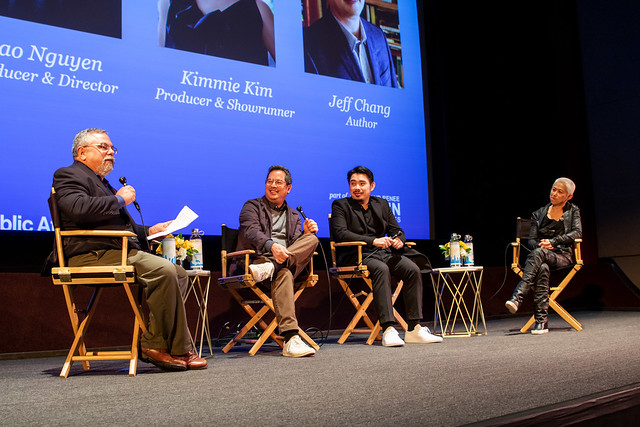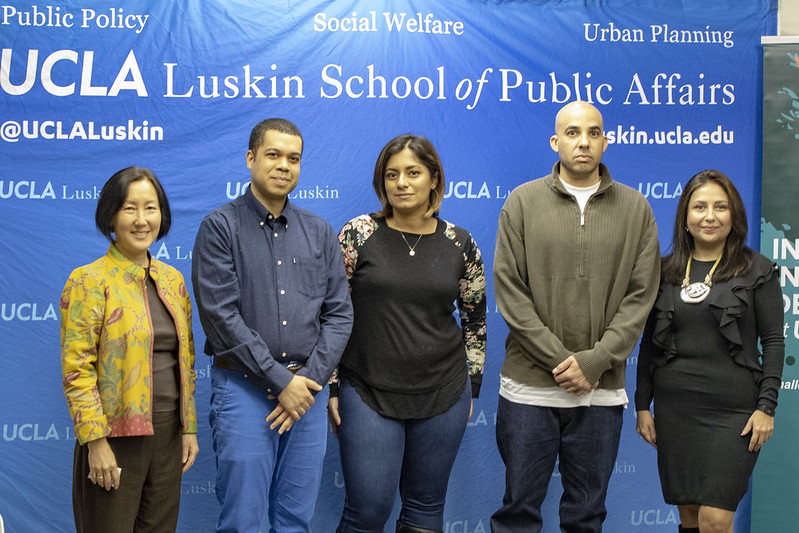By Les Dunseith
As writer and journalist Jeff Chang sees it, today’s political divisiveness is leading America to revert to a time when society was more starkly divided along intellectual, cultural and racial lines. It’s a social erosion he refers to as resegregation.
“We had a consensus 50 years ago — as fragile as it was — that segregation was an issue that we needed to work on as a nation,” Chang said during a Jan. 15 Luskin Lecture at the James Bridges Theater on the UCLA campus. His remarks followed the screening of a series of short documentary-style videos based on “We Gon’ Be Alright,” Chang’s critically acclaimed collection of essays about the rise and fall of the idea of diversity.
Event attendees also had an opportunity to hear from the filmmakers — producer and director Bao Nguyen and showrunner Kimmie Kim. The evening’s moderator was Dean Gary Segura of the UCLA Luskin School of Public Affairs.
The docuseries was produced for PBS’ Indie Lens Storycast, and a YouTube collection where the 8-10 minute segments can be viewed describes the docuseries as follows: “From Silicon Valley gentrification and resegregation to new Hollywood attempts to overcome typecasting by diversifying, from college admission debates to the flawed U.S. census’ way of categorizing race, the series asks the questions: How did we become so divided, and what can we do now to be alright?”
Segura asked a tongue-in-cheek but pointed first question of the panelists after the last of the four serious-minded documentaries: “‘We are gonna be all right?’ Are you sure? This is not an optimistic piece.”
Chang acknowledged that the oft-foreboding tone of the videos was a reflection of his book, saying that “if it were up to me, the series would have been really much more depressing.” He credited his collaborators with helping him find a positive perspective where possible.
“Bao was very much like, from the very beginning: ‘We’ve got to be able to find the hope in all of this,’” Chang recalled.
“Culture, art, film and music can help fill a void,” Nguyen said. “That’s how I kind of see my role. Filmmakers make stories that have some sort of inspiration — because we don’t see that on the news or in our public leaders today.”
Kim, a Korean-born filmmaker who has been working in the U.S. entertainment industry for about 20 years, noted that lack of diversity in Hollywood is a longstanding problem. When she first started in New York City, working with MTV, “there were only two Asians in pretty much the entire building.”
Diversity of ethnicity and gender remains an industry shortcoming, she said. “I want to remain optimistic,” she said of her experience as an Asian woman working in the U.S. entertainment industry. “But it is definitely a struggle.”
One positive sign for Kim is the nomination of the South Korean film “Parasite” as a Best Picture contender at this year’s Academy Awards. “It’s the first time,” she said, “but that doesn’t mean that there weren’t any other great Korean films — or Japanese or Chinese films — before.”
The intersection of entertainment and political activism has long been important to Nguyen, whose career history includes a stint as a field director and field organizer for Obama for America.
“I think everything’s kind of intertwined,” he said. “Culture doesn’t exist without politics, without learning about history and context, and so I bring that into the work that I do.”
The first segment in the docuseries deals with the issue of displacement by focusing on East Palo Alto, a California Bay Area community where longtime minority residents are being displaced because real estate speculators are buying houses in hopes of future profits. In some cases, the houses are being left vacant until enough well-to-do residents move onto a block to drive up home prices throughout the neighborhood.
“This is the last quote-unquote affordable neighborhood in Silicon Valley,” said Chang, noting that affordability means something very different to someone making more than $170,000 a year than it does to most of the people of modest means who had historically lived and worked in East Palo Alto. “Those people are being displaced, and that’s resegregation in a nutshell.”
Chang noted that the word gentrification is literally derived from the word gentry — the class of rich people just below the nobility in the United Kingdom. Likewise, in places like East Palo Alto, “the wealthy are moving in, and it ‘disappears’ the people who are forced to move out.”
Another segment in the docuseries focuses on inter-ethnic tensions, particularly from the point of view of Asian Americans.
Many Asian Americans are “self-conscious of both our oppression and our privilege,” Chang said.
Chang was studying toward a master’s degree in Asian American Studies at UCLA during the time of the 1992 Los Angeles uprising. At the time, there was a notion that Asian American Studies should focus solely on the experiences of Asian Americans, he recalled.
“And I think, for those of us who came of age during that particular period, our reality was much different,” Chang told the audience. “It became a reflection on the position that Asian Americans can take against racial injustice — Asian American empowerment or … empowerment for everyone.”
“To me, it’s like trying to figure out this whole labeling system,” Kim said. “It’s great to embrace who we are. But if the labeling works against who we are and separates people, then that’s where I think we need to have an in-depth conversation to find a better balance and live together.”
As a filmmaker, Nguyen said he looks for opportunities to attack racial problems at the systemic level by helping to bridge communities.
People of all races should be encouraged to tell their stories, he said. “The truest enactment of the American Dream is being able to tell your own story. I think that’s what I’m trying to do as a filmmaker. I think that’s what we’re all trying to do — to tell our own story, because we think once our voices are heard, then we can be seen.”
In addition to the UCLA Luskin School of Public Affairs, the event was co-sponsored by UCLA Asian American Studies and its Center for Ethno Communications. Other co-sponsors were the Bunche Center for African American Studies at UCLA, UCLA Chicana and Chicano Studies, the UCLA Luskin Undergraduate Program and Visual Communications.
View photos from the event on Flickr:

Watch highlights from the live stream of the event:


